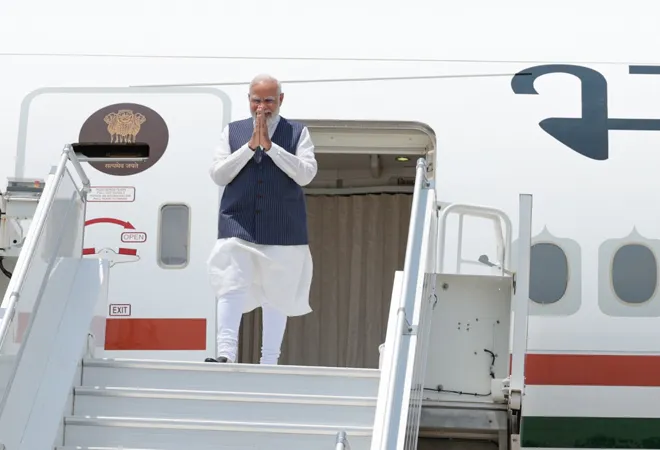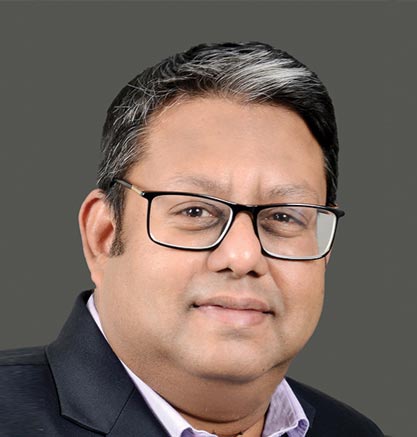-
CENTRES
Progammes & Centres
Location
As PM Modi visits the US, foremost on his agenda will be the need to promote the renaissance of individualism, internationalism, and multilateralism, and the value of being the change one wants to see in the world.

Prime Minister Narendra Modi touched down in New York on 20 June for a historic state visit to the United States (US), his first since he became PM in 2014. A White House statement had earlier observed, “The <…> visit will affirm the deep and close partnership between the United States and India and the warm bonds of family and friendship that link Americans and Indians together.” Indeed, the event further secures ties between the world’s oldest and largest democracies. Crucially, it also allows PM Modi to advance his mission of taking India to the world, internationalising a deeply felt personal belief system, and demonstrating Indian leadership on the global stage.
One of the PM’s first engagements in the US—leading the observance of International Yoga Day at the United Nations (UN) headquarters—directly reflects these three principles. Addressing the UN, he said that yoga presents the spirit of “Ek Bharat, Sreshtha Bharat” as a model for the world. It “expands the inner vision” and helps “eliminate our contradictions, blockages, and resistances.” India has “always nurtured traditions that unite, adopt, and embrace,” and yoga itself is an extension of the idea of Vasudhaiva Kutumbakam.
The visit will affirm the deep and close partnership between the United States and India and the warm bonds of family and friendship that link Americans and Indians together.
The PM’s earlier, and successful, push for 2023 to be celebrated as the International Year of Millets and his launch of the pathbreaking LiFE initiative have been guided by the same imperatives. In both cases, a quintessentially Indian practice or ethic has been elevated from the realm of the personal to the universal, and is now acclaimed as a global best practice. Millets offer enormous nutritional value and measures to promote domestic and international demand will boost sustainable production and consumption. Similarly, the environment-friendly lifestyle changes that we make as individuals will help build a cleaner, greener planet.
This broad framework of principles has shaped India’s presidency of the G20 and the country’s emergence as the legitimate voice of the Global South. It has also served as the bedrock of the PM’s efforts to re-engage with fundamental social contracts and advocate for a new individualism, a new internationalism, and a new multilateralism.
Digital empowerment will be the principal arena for the rise of a new individualism. Hence, the promotion of digital public infrastructure (DPI) has been a core priority of the Indian G20 presidency. India became the first country to create all three foundational DPIs—a unique identity system, a real-time fast payment system, and a platform to share personal data without compromising privacy. Collectively, these three layers have transformed public service delivery and citizen empowerment, and unleashed innovation on an unprecedented scale. Today, more than 99.9 percent of Indian adults use their Aadhaar ID to avail public services, Indians makes 30 million transactions every day via the Unified Payments Interface, and the country operates the world’s largest tech-enabled financial inclusion programme. India is sharing its DPI expertise with the world and has grabbed the attention of the Global North. Interacting with PM Modi on the first day of his visit, American economist Paul Romer said that India “can show the world how to do it right” as far as tech solutions like Aadhaar and the Digilocker go. Recent statements by the Quad Leaders and the EU-India Trade and Technology Council too have emphasised the transformative power of DPI.
He has set India the ambitious goal of reaching net-zero by 2070, but is conscious that a new internationalism can only be born of a new order of climate collaboration.
PM Modi is keen to engineer a new contract between people and the planet. He has set India the ambitious goal of reaching net-zero by 2070, but is conscious that a new internationalism can only be born of a new order of climate collaboration. Accordingly, India and France co-founded the International Solar Alliance (ISA) in 2015 for countries to jointly develop and deploy cost-effective solar-led clean energy solutions. Today, the ISA counts 114 nations as members, and its ‘One Sun, One World, One Grid’ programme, launched by PM Modi, is regarded as a visionary effort to connect different regional grids through a common grid that can transfer renewable energy power across borders. Taking climate action a step further, in 2019, the PM established the multistakeholder Coalition for Disaster Resilient Infrastructure (CDRI) to strengthen the resilience of infrastructure to the risks of climate and disasters. Among other countries, the US has formally lauded India for setting up the CDRI, and USAID has committed funds and knowhow to support its work.
Finally, India’s voice has been among the strongest calling for a new and reformed multilateralism. In February, PM Modi urged G20 finance ministers and central bank heads to take urgent steps to reform and revitalise multilateral development banks. Addressing the UN Security Council (UNSC) in April, the Indian Permanent Representative called the UN Charter “anachronistic”, and lashed out at the UNSC’s system of five Permanent Members with a veto power, arguing that five nations cannot be made “more equal than others”. Both interventions underscore the Indian position that an overhaul of the UN and Bretton Woods institutions is now critical.
The India-US relationship has grown steadily stronger during this period, as indicated by the bilateral Initiative on Critical and Emerging Technology, a major imminent defence deal, and congruent perspectives vis-a-vis the Quad.
The last nine years have been a period of intense geopolitical and geoconomic shifts, exacerbated by a global pandemic, territorial incursions, and financial recessions. The India-US relationship has grown steadily stronger during this period, as indicated by the bilateral Initiative on Critical and Emerging Technology, a major imminent defence deal, and congruent perspectives vis-a-vis the Quad. But as PM Modi visits the UN and goes on to meet President Biden, foremost on his agenda will be the need to promote the renaissance of individualism, internationalism, and multilateralism, and the value of being the change one wants to see in the world.
Anirban Sarma is a Senior Fellow at ORF.
The views expressed above belong to the author(s). ORF research and analyses now available on Telegram! Click here to access our curated content — blogs, longforms and interviews.

Anirban Sarma is Director of the Digital Societies Initiative at the Observer Research Foundation. His research explores issues of technology policy, with a focus on ...
Read More +